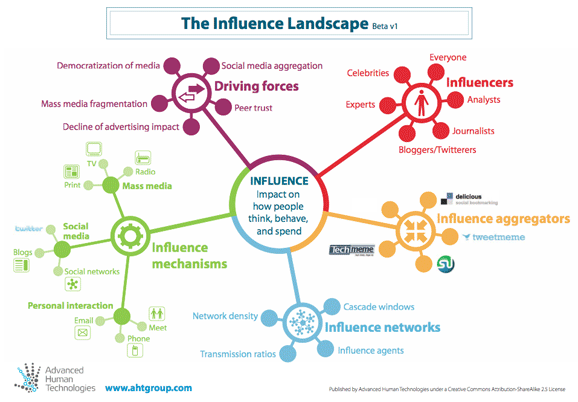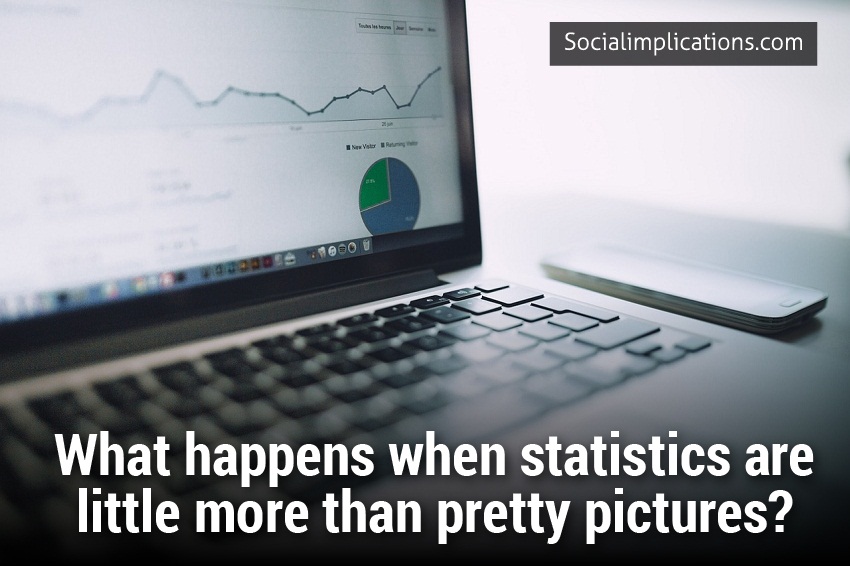
You’ve heard about “influencers” right? That’s a big buzz word especially in the blogosphere these days (and it has been for a couple of years). What exactly is an influential blogger though? Do those lists of the most influential blogs or biggest influencers really mean much?
Honestly, they don’t. Why? Because sadly too many people confuse “influence” with basic popularity. Is there anything wrong with having a popular blog or being a popular personality in your niche or industry? No. Of course not. But being popular doesn’t mean you necessarily have a comparable amount of influence within that niche. Let’s explore both popularity and influence, and talk about why you really need to understand the difference. While we’ll look specifically at bloggers, the same can be true of those on Twitter, social networks, or who are active in any other area of social media.
Defining Popularity and Influence
What does it mean to be a “popular” blogger? It means that people like you (or they like your blog). Specifically related to blogging, it generally means a lot of people like you. You get a lot of traffic and / or a lot of unique visitors. You get a lot of comments. You get the idea….
If you have a lot of traffic, you naturally have a lot of influence, right? Wrong. Influence involves more than numbers. It involves your ability to influence outcomes, actions, and opinions.
The Biggest Difference Between Popularity and Influence

Let’s look at two hypothetical blogs to show why popularity doesn’t necessarily equate to influence. They’re both Internet marketing blogs. Blog A is a relatively high traffic blog — let’s say just under one million pageviews per month. Blog B gets around 75,000 pageviews per month instead (still not terrible, but clearly Blog A has them beat).
You could easily argue that Blog A is the more popular blog of the two. Assuming in this case that the larger number of pageviews comes from a larger number of unique visitors, Blog A has more readers / visitors.
That said, Blog B could still be the more influential blog. Numbers alone don’t cut it. The relationship between the blogger and their audience determines influence much more than traffic stats (or follower stats, or friend counts, etc.).
For example, maybe most of Blog A’s traffic comes from search engines. The visitors are one-time passersby who only visit the page they land on. They read the content and then they move on. Blog B’s fewer readers are much more invested in the blog. They read regularly. They genuinely care about what the blogger has to say.
If Blogger A told their audience to do something, they might have less influence over their actual actions than Blogger B. The second blogger’s audience might be more likely to do what’s asked of them — think a certain way about a niche issue, try a new tool, take part in a survey, or even buy a product. That’s influence.
Popularity in blogging can leave a lot to chance (or basic search engine optimization). A blogger has to be able to take things a step further if they want to turn that popularity into influence. By all means, a popular blog can be influential. Many are. The mistake is in thinking that one necessarily equals or leads to the other.
Measuring Influence: Can it be Done?
Why do people often rank blogs by “influence” when they’re really only evaluating popularity metrics? Well, “influence” sounds better for starters. Who doesn’t want to feel like they have influence? It’s a power thing, whereas popularity is nice but it’s something tweens and teens are supposed to worry about — not professionals blogging within a given industry.

Influence sounds better, but popularity is easier to measure. So they get packaged together whether or not it’s completely fair, “right,” or accurate. Is it even possible to measure influence? Personally, I consider it more of a qualitative than quantitative element of blogging and social media, and as such I would have to say it’s difficult, if not impossible, to accurately measure.
A blogger with a relatively small audience might have major pull in the industry because of their network. If they report a problem to a company, it might be fixed in hours or days instead of buried in a mountain of support tickets. If they request a new feature from someone, they might actually get it whereas others would be ignored. They might be able to change the minds of their audience members about an issue that’s important to them. I don’t see how those things can be accurately or fairly measured. Would action #1 get more weight than action #2? How many minds do you have to change to be “influential?”
Sure, we can measure some elements of influence — how many readers were converted into customers, the number of survey respondents, donations received when a blogger gets behind a cause, etc. But we can’t measure enough of the factors that determine influence to really say Blogger A is more influential than Blogger B, because the results of influence aren’t always visible. To outsiders, it’s all subjective.
If you really must rank the most “influential” blogs in some way, do what you must. But why not call it what it really is — the “most popular” blogs — instead? The two can coincide. We don’t need to belittle the influence of some bloggers by calling them less influential than others simply because they’re better at targeting a narrow audience that cares about what they have to say. You don’t see what goes on behind the scenes. That “little” blogger you left off your list might be the one making a real difference. Let’s go back to calling a spade a spade, shall we?














How can you possibly measure influence of a blog when they aren’t always giving you a call to action? How could you even know how this blog post might influence me–or IF it influences me?
Not only are people getting oddly wrapped up in so-called “influence” but they are also buying into this idea of “Thought Leaders.” Unfortunately, these so-called thought leaders are often regurgitating the thoughts that someone else already had–only they are doing it louder and to a bigger crowd. So again, we confuse popularity with leadership and influence. It’s like we never leave high school.
Awesome article Jennifer!
If you are aiming to build a successful blog in the long-term, then the art of being influential is definitely what you should be focusing on perfecting. A lot of bloggers are just focusing on getting tons of traffic when they should be focusing on attracting quality visitors who will engage the site, leave comments and connect. Though the road to influence may entail more work, it will pay off.
I would exchange popularity for influence any day.
Keep up the good work Jennifer, nice article.
Popularity can be an influence and influence can be popular. Influence may appear to be the more ‘nobler’ of the two but there are many powerful influencers who offer little meaningfulness and there are popular sources of meaningfulness (rare of course).
Robyn – Thanks. 🙂 And I agree completely. That’s true for most things though — the ones requiring you to work hard for them are often the ones that prove to be most worth pursuing.
Sam – I’m not sure I agree with you. Popularity and influence can certainly coexist, but I don’t think popularity “is” influence, and influence isn’t really “popular.” They’re two different things — one dealing with eyes (or ears) your message gets to and the other dealing with persuasion. Maybe I’m just misunderstanding what you’re trying to say. If so, sorry.
Nice article Jennifer. I agree with you that popularity is different from influene ability and that influence is more important or at least what we mostly want. But this then leads to the question: as a blogger (or owner of a site), is the process of making our blog more popular different from making it more influencial? I think the process is very much similar and a blog has to become popular before it can become influencial ‘coz if not many people vist your blog, how much influencial can it have? Or you think it can be the other way around, influencial but not popular? Can you share your thoughts on this.
I am always happy to read wisdom that can be applied to a particular purpose. I totally agree that popularity and influence are two very different things. In order to achieve your goals it is very important to understand the difference.
If your goal is simply more visitors or retweets, popularity can get you there. If you have more specific goals and especially if your goal is increased conversions, identifying who has the most INFLUENCE is vastly more useful.
There are many people who are influenced by those who are popular, so if what you are offering would appeal to those who want to follow the popular crowd, popularity might get you there.
If, on the other hand, what you are offering is complicated or appeals to a thinking crowd NOW you really need to identify who people interested in your product or service trust and believe. While it is challenging to measure influence with analytics it is NOT that hard to tell if you’re paying attention to what their readers are saying.
It is not uncommon for someone to Tweet that they took a particular action based on what someone wrote or bought something because someone specific recommended it. While they MIGHT be only seeking attention those messages DO indicate that people at least want to claim actions motivated by a specific popular or influential person.
If you want to know who is influential use tools like Social Mention or Trackur and see what the public is saying. Notice who writes about and links to the ORIGINAL source of an idea. If your potential influencer is part of the DoFollow CommentLuv KeywordLuv community that believes in interacting in their blogs, their commentators will give you the evidence of influence you need.
Watch for comments indicating that someone took action on what they wrote. Often you will see feedback on what that person thought about the product or service recommended or follow-up questions asking how to configure a new plugin or use a paid service. This allows you to judge how accurate the potential influencer’s recommendations are.
I do believe there are people who are thought leaders – some famous like Seth Godin, Guy Kawasaki, Tim Ferriss and Kevin Kelly – and others less well known but highly respected by other thinkers like Louis Gray and Adam Singer. It is obvious who is a thinker and who is “regurgitating the thoughts that someone else already had” (as Yo wrote) – at least it is obvious to other thinkers and those who are interested enough to do some research.
Sometimes a little known blogger with a very small following can be highly influential because their writing and thoughts influence the influencers and/or the popular bloggers. A wise marketer will make sure not to dismiss those who write on a very intellectual level and influence what those popular, influential other bloggers think, write and recommend.
The bottom line is to first determine what your goals are and then decide what type of blogger you need to meet the specific goal you have in mind. The better you do this and the closer the fit the more success you will have.
Vinh — You definitely don’t have to make a blog popular before it can become influential. You can influence even a single reader while a higher traffic blog might influence none (like a splog that happens to get traffic for example). Being more popular might increase your reach and therefore increase your influence potential, but I’d say it doesn’t necessarily lead to more influence and it definitely isn’t required to become influential as a blogger.
Gail — The tools you mention might be a decent place to start trying to figure out who’s influential. But remember, a lot of that influence cannot be measured. Even in cases where it can be measured by the supposedly influential person (sales conversions for example), that information isn’t necessarily available to the public.
I love this topic and the way in which it’s been addressed here.
As a matter of fact, I tackle it too in a post on blogging as well.
I think it’s very relevant to today’s blogging environment and dynamics. I would definitely take influence over popularity; and in my own way I feel that I have by devoting my writing efforts to issues that are important as opposed to those that are perhaps most popular.
I think success should be measured by quality not quantity, and the level of engagement and interaction of one’s blog readers.
I’m glad you liked the post Jennifer. 🙂
You bring up a good point — focusing on issues you feel are important rather than what everyone else happens to be talking about. I do think that’s a common trait of influential bloggers. When readers know you’re blogging what’s on your own mind, I think it helps them connect to (and trust) you as a blogger, which in turn does lead to influence. In this case it’s even a more direct influence — even if not influencing someone’s opinions, by talking about something not “done to death” you do influence what they’re thinking about more than other bloggers in your niche or industry.
A very well thought of and written article. I never got the idea that there is a difference between the two. It is more preferable to be influential than popular. But influence comes along with the bonus of popularity. Am I right?
Not always. Influence and popularity sometimes go hand-in-hand, but they can exist independently of each other too. For example:
– You can have a “popular” blog (a lot of traffic, a lot of tweets / retweets / shares, etc.), but have very little influence in the sense of being able to change or reinforce opinions or drive your readers to action. A very clear-cut example would be a heavily-promoted splog (spam blog that scrapes content from elsewhere) with no personal connections from the “blogger.” You can get a lot of traffic to the site even if it’s just aggregated material, but the site itself has no influence over readers. At best, the authors of the scraped content have the influence. It’s rarely that clear-cut though. More often you’ll find popular bloggers who just can’t get their audience to take certain actions because the content or style isn’t really designed to do that.
– You can have a relatively unpopular blog in a narrow niche. You won’t have a lot of readers, but if you’re an authority source in that small niche community, you can still have quite a bit of influence in the niche or industry. Consider a very highly specialized medical condition that might affect only 20,000 people worldwide. Even if every single person affected read the blog, it would never be “popular” by today’s standards. But let’s say that blog is run by one of very few doctors specializing in that area. They’re known as the leading expert on the subject. Even though they may never reach an audience of hundred of thousands (or millions) of readers, they can exercise a lot of influence over the smaller community they do reach.
So no, being influential doesn’t lead to popularity. And popularity doesn’t mean you have influence. And that’s not even considering things like degrees of influence. For example, getting people to RT something would considered “influence” by some. If that’s the most you have going for you, I’d call that fairly worthless influence. Anyone can do that by being controversial or sharing links to cutsie crap online. Compare that to someone who can regularly get a large audience engaged in supporting a cause, donating to a certain charity, attending live events, etc., and the level of influence is a bit higher.
Anyone can get people to do something that takes little or no effort if they try (like linking, clicking, or RTing). Not everyone has true influence where they affect people on a deeper level or make a more serious impact on the world, business, or their community.
interesting I never thought there was a difference between the two I figured numbers meant influence, apparently not. Good to know.
[…] Popularity Versus Influence in Blogging and Social Media […]
[…] on popularity as if it demonstrated any semblance of authority. It began with the blog “influence” lists or rankings based on faulty metrics (like the Power150 or Edelman’s social media […]
[…] the longstanding complaint of influencers updating too frequently about issues that are too trivial, simply because they’re too important […]